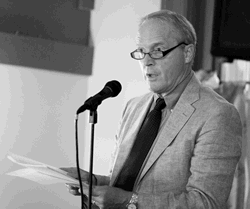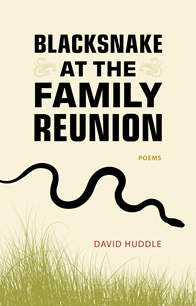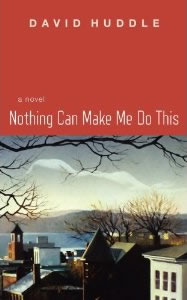David Huddle, author of seven story collections, three novels, seven volumes of poetry, and a book of advice for writers, holds the 2012-13 Roy Acuff Chair of Excellence at Austin Peay State University. Now seventy-one, he shows no sign of slowing down: since October 2011, Huddle has published a novel, Nothing Can Make Me Do This, as well as a collection of poems, Blacksnake at the Family Reunion. His writing has appeared in The New Yorker, Harper’s, Best American Short Stories, and other publications. He has been awarded two fellowships in literature from the National Endowment for the Arts, the Lawrence Foundation Prize for the short story, and the James Wright Prize for poetry.
Huddle is as much a master teacher as he is a master stylist: for thirty-eight years, he taught creative writing at the University of Vermont, and he continues to teach graduate students at the Bread Loaf School of English. In advance of his fiction reading at Austin Peay on February 12, Huddle answered questions from Chapter 16 via email.
 Chapter 16: You once called short fiction the form to which you feel most naturally suited, while poetry was more intimidating; it took you years, you said, “to sidle up next to it.” With a new book of poems from L.S.U., one of the premier poetry presses in America, you don’t seem to feel intimidated anymore. What’s changed?
Chapter 16: You once called short fiction the form to which you feel most naturally suited, while poetry was more intimidating; it took you years, you said, “to sidle up next to it.” With a new book of poems from L.S.U., one of the premier poetry presses in America, you don’t seem to feel intimidated anymore. What’s changed?
David Huddle: I’ve read more, written more, and lived more. I’ve had the good luck to be moderately successful in publishing, and so I feel that the community of poets and readers has granted me some validation. Maybe more importantly I’ve acquired the ability to judge when I’ve written a strong poem and when I’ve written a weak one. But I wouldn’t say I’ve overcome intimidation. To the extent that I crave to read poems that move and educate me, I think I actually cultivate intimidation. When I encounter a great poem—even ones I know very well from reading them in class with students many times over the years (e.g., Archibald MacLeish’s “Eleven,” Robert Hayden’s “Those Winter Sundays,” Robert Hass’s “Meditation at Lagunitas,” or Ellen Voigt’s “Song and Story”)—I feel intimidated. For a writer my age it’s a form of happiness. There are hundreds of dead poets and many living ones whose level of accomplishment is notably higher than mine and higher than mine will ever be. Reading their work has made mine stronger.
Chapter 16: Recently you wrote an essay that begins, “When I’m not writing I go through phases. Vague uneasiness. Mild anxiety. Crankiness. Nasty beating up of my vulnerable self. Days of brooding.” During the droughts, how do you maintain faith that you’ll be writing again?
I thought of writing as hard work, as discipline, even as a kind of gift I was trying to make to the world of readers. She’d made it sound like smoking or trying to get attention or avoiding social situations.
Huddle: About a dozen years ago I had a conversation at a cocktail party with a very smart and powerful editor who asserted that writing was a need many people had. I think she meant the comment as a kind of scientific observation, but since I’d just published a novel that had received some praise—and that I’d thought of as a real accomplishment—I took her suggestion that I’d done it out of neediness as a put-down. I thought of writing as hard work, as discipline, even as a kind of gift I was trying to make to the world of readers. She’d made it sound like smoking or trying to get attention or avoiding social situations.
I’ve come around to accepting what she said. Maybe I didn’t need to write when I first started doing it seriously in my mid-twenties. But now that I’m in my seventies, I know that I do need to write. In the same way that I need to exercise, I need to be with my family, I need to laugh. So when I’m not writing, I feel as if I’m failing my art and failing myself. And my “faith” that I’ll come back to writing is very reasonable since in the past I always have come back to it. But the rock bottom truth is that I’ll be writing again because I need to write. It’s scientific that the need exists, but the need itself—to create—is quintessentially human. Given what I believe about myself, no one should be surprised to hear that I believe that as long as he stays physically capable of doing so, Philip Roth will write another novel. And maybe he’ll do it pretty soon.
Chapter 16: John Berryman said that the writer “is extremely lucky who is presented with the worst possible ordeal which will not actually kill him. At that point, he’s in business.” Do you share that view about your own ordeals?
 Huddle: Well, I admire this assertion of Berryman’s—and he’s one of those “great” poets whose work sometimes intimidates me at the same time I love it—but he lived a life that was very different from mine. I’ve had hard times and difficulty and maybe even one period of about a year that I’d consider an ordeal. I guess he’s right, I do feel that I’ve been humbled a few times by my life—and that ultimately that humbling has been good for me. Even so, I resist the drama of Berryman’s phrasing. I resist it as a general observation about writers, not as a description of his experience—he did, after all, commit suicide in an extremely dramatic way. But if I’d said the same thing, I know I’d be exaggerating.
Huddle: Well, I admire this assertion of Berryman’s—and he’s one of those “great” poets whose work sometimes intimidates me at the same time I love it—but he lived a life that was very different from mine. I’ve had hard times and difficulty and maybe even one period of about a year that I’d consider an ordeal. I guess he’s right, I do feel that I’ve been humbled a few times by my life—and that ultimately that humbling has been good for me. Even so, I resist the drama of Berryman’s phrasing. I resist it as a general observation about writers, not as a description of his experience—he did, after all, commit suicide in an extremely dramatic way. But if I’d said the same thing, I know I’d be exaggerating.
I guess the difference is that Berryman sounds like he’s talking about ordeals available only to writers, and the hard times I’ve encountered are ordinary ones, available to just about anybody. It may also be the case that since I’m as much a fiction writer as I am a poet, I have a more working-class approach to writing. A final thought I have is that Berryman was one of those poets who set out to write masterpieces, and that probably enhanced the dramatic content of both his life and his writing. I don’t strive for masterpieces; I just try to write as well as I possibly can on any given day.
Chapter 16: You’ve called Glory River a “remake” of your first book of poems, Paper Boy, in that the first published versions of those poems relayed more or less “what really happened,” while later incarnations were “lying and exaggerating at every opportunity.” Are you conscious of reworking elements of earlier poems or prose in your most recent work?
Huddle: No. Actually only the first half of Glory River is the remake of Paper Boy, and that’s because I wrote another half a book’s worth of poems that tried a little too hard to carry out the project. Fortunately Dave Smith, my editor for his Southern Messenger series at LSU Press, encouraged me to leave out the less successful poems. The second half of Glory River is made up of poems that mostly eschew “lying and exaggerating.” I think Glory River may be the only time I’ve taken on a “remaking” project. My inclination is to keep moving on, to try to write something new every time out.
Chapter 16: Your writing covers a tremendous range of experiences, takes many forms, and assumes different voices. Do you view yourself as a certain kind of artist who makes forays into other forms? Or are you more like a natural polyglot?
The occasion of writing for me has to be an act of serious spiritual interrogation.
Huddle: I think I’d better go with “natural polyglot.” I don’t have much luck “planning” what I’m going to write from one book to the next. I write what comes to me. I also write a lot, and end up not trying publish about half of it. And much of what I publish in journals doesn’t end up in a book. I can say that I’ve been thrilled with some of the possibilities that have opened up for me as a result of the new genre “creative nonfiction”—and I hope to write more of those pieces. Also I’m becoming more of a novelist than I used to be. But even if I’m a polyglot, I’m actually a pretty basic kind of artist—I make narratives.
Chapter 16: You’ve described some of your longer poems as narratives comparable to short stories or personal essays. How do you decide whether to tell a story in prose or poetry?
Huddle: This one is easy to answer. If my first draft starts out as sentences-in-paragraphs, and it stays that way for a couple of paragraphs, then the thing I’m composing is likely to end up as prose. If the first draft starts out as lines and stanzas, and it stays that way through a certain number of lines, then the composition will be a poem. Once or twice I’ve started out trying to compose in lines and stanzas but then discovered that I really needed to be writing in sentences and paragraphs. I don’t recall a time when I went very far with composing in sentences and paragraphs then switched to lines and stanzas. If I’m going to change, it’s much more likely that I’ll switch from poetry to prose than the other way around. The piece I’m working on usually makes its nature known before I get very far along in my composing.
 Chapter 16: Since you first started writing poems forty years ago, has anything changed about the world, or about you, that has significantly affected the way you approach writing a poem?
Chapter 16: Since you first started writing poems forty years ago, has anything changed about the world, or about you, that has significantly affected the way you approach writing a poem?
Huddle: I’ll try to give a simple answer to this very difficult question. I’ve come to believe, more and more, that I have to put myself as deeply and as directly as possible into my writing. And that the occasion of writing for me has to be an act of serious spiritual interrogation. I haven’t lost faith in the possibility that art can make meaning that will be of value to a reader/viewer/listener. Maybe it’s not that much of a change, but it seems so to me. At twenty-five, I thought it was all a matter of cleverness and skill; at seventy-one, I’m pretty sure it’s all a matter of heart.
Chapter 16: Have there been times when you felt you had to choose between teaching and writing, or have the two always complemented each other?
Huddle: In this regard I underwent a major change starting in 1996, when I was fortunate enough to teach a community workshop at the Fletcher Free Library in Burlington, Vermont, under the auspices of the Silver Bay Writer’s Voice Center. All the members of that workshop were people of notable commitment and accomplishment. We decided (by voting) from one week to the next what kind of an assignment we’d take on, and I wrote the assignments along with the other workshop members. It worked so well—and it was so thrilling to me to write the assignments and to read them aloud in the company of my brother and sister writers—that I used more and more of the concept in my undergraduate teaching at the University of Vermont and my graduate teaching at the Bread Loaf School of English. It’s logistically complicated to try to make that approach work in prose workshops, but I’ve learned how to manage it. Before I made that change, my writing and my teaching were always in conflict. I felt I had to cheat on one of them in order to be responsible to the other. The change was that I moved my writing into my teaching—to the betterment of the writing, the teaching, and my emotional health.
On February 12 at 7:30 p.m., David Huddle will read from his 2011 novel, Nothing Can Make Me Do This, in Room 303 of the Morgan University Center at Austin Peay State University in Clarksville. The event is free and open to the public.
Tagged: Poetry





